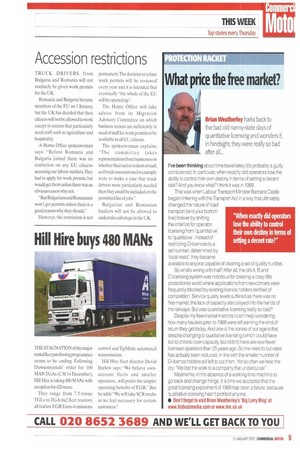What price the free market?
Page 9

If you've noticed an error in this article please click here to report it so we can fix it.
Brian Weatherley harks back to the bad old nanny-state days of quantitative licensing and wonders if, in hindsight, they were really so bad after all...
I've been thinking about time travel lately (it's probably a guilty conscience). In particular, when exactly did operators lose the ability to control their own destiny in terms of setting a decent rate? And you know what? I think it was in 1968.
That was when Labour Transport Minister Barbara Castle began tinkering with the Transport Act in a way that ultimately changed the nature of road transport (and your bottom line) forever by shifting the criterion for operator licensing from 'quantitative' to 'qualitative'. Instead of restricting 0-licences to a set number, determined by 'local need', they became available to anyone capable of clearing a set of quality hurdles.
So what's wrong with that? After ail, the old A, B and C licensing system was notorious for creating a cosy little protectionist world where applications from newcomers were frequently blocked by existing licence holders terrified of competition. Service quality levels suffered as there was no free market; the lack of capacity also played into the hands of the railways. But was quantitative licensing really so bad?
Despite my free-market instincts I can't help wondering how many hauliers prior to 1968 were left earning the kind of return they get today. And one of the ironies of our age is that despite changing to qualitative licensing (which could have led to chronic over-capacity, but didn't) there are now fewer licensed operators than 25 years ago. So the need to cut rates has actually been reduced, in line with the smaller number of 0-licence holders still left to cut them. Yet so often we hear the cry: "We lost the work to a company that undercut us!"
Meanwhile. in the absence of a working time machine to go back and change things. it is time we accepted that the great licensing experiment of 1968 has peen a failure, because qualitative licensing hasn't profited anyone.
• Don't forget to visit Brian Weatherley's 'Big Lorry Blog' at www.bizbuzzmedia.com or www.tnn.co.uk
"When exactly did operators loss the ability to control their own destiny in terms of setting a decent rate?"










































































































































































